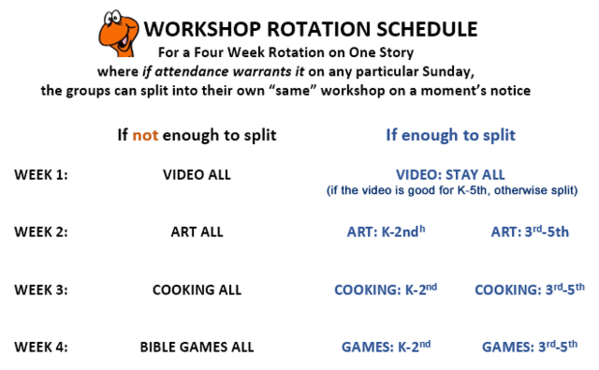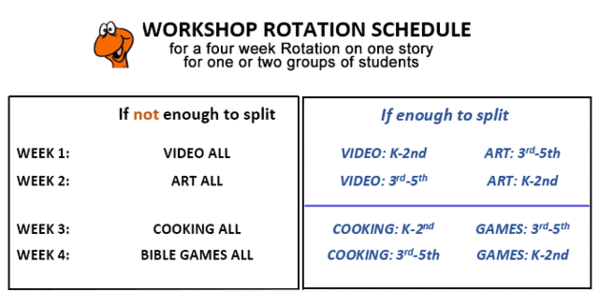Article: The Workshop Rotation Model After the Pandemic
How the Model can Help Adapt to Attendance Challenges
How the creation of an Outreach Workshop
can make care beyond the classroom a regular part of our ministry
2020-2022's COVID pandemic disrupted everything in the Church. Many families have returned, but some have not. And many of those who have returned have come with cold feet. In larger churches, this is less of a setback, but in many smaller churches, "less" threatens the MORTALITY, not just the vitality of Sunday School.
Of course, this is happening in the midst of a historic trend toward less frequent attendance and lower church membership across the U.S. We have our work cut out for us.
Looking at our post-pandemic needs and realities, I believe that there are certain FEATURES of the Rotation Model that can help Sunday Schools adapt to attendance challenges and the need to ATTRACT families and kids back to Sunday morning. Since sharing these thoughts, many Rotation educators have agreed!
The Workshop Rotation Model has the flexibility and creative attractiveness many Sunday schools can use to adapt, rebuild, and do better.
there are certain FEATURES of the Rotation Model that can help Sunday Schools adapt to attendance challenges and the need to ATTRACT families and kids back to Sunday morning.
Why is the Workshop Rotation Model still a great model for teaching?
- Because the BRAIN SCIENCE still tells us that teaching one story through many creative approaches is the right way to teach. It's also better for memory formation -- more brain science!
- Because the workshop concept is a fun way to teach and learn and design inviting spaces.
- The Rotation Model is scalable up or down, and its design and schedule can flex during the year and over the years with attendance. See Rotation.org's many WoRM scheduling examples. SEE ALSO THE VIDEO IN THE NEXT POST!
- Rotation.org! No curriculum has a bigger creative resource base or a greater variety of lessons, creative ideas, and community support than we do. And most of our content is free.
But then COVID shut down our churches and classes, and it forced a lot of us to both scramble AND begin thinking about the post-pandemic future and it's scary new normal.
I know there are many people who are still exhausted and don't want to hear any of this. They wish for a return to pre-COVID programming. But you and I and everyone reading this knows that the ground was beginning to shift underneath us long before we'd even heard of coronavirus, and most of the trends we were experiencing will be accelerated by the crater left by COVID.
In addition to seeing how the Rotation Model gives us the organizational tool to ADAPT to new normals of attendance, the COVID shutdown and our creative responses to it have REKINDLED a gut feeling that "in-class Christian education" is only PART of the teaching picture, and that we need to look at adding other ways of connecting and teaching if we want to be part of the future instead of a relic of the past. The Rotation Model itself was a response to need, and thus, it doesn't surprise me to see how we can adapt the "best of" Rotation to meet new teaching opportunities.
In fact, I don't know a serious Christian educator who doesn't ASPIRE to reach and teach kids and families BEYOND Sunday morning and their buildings.
The question has always been how to turn that Outreach aspiration into a sustainable practice --and there the Workshop Rotation Model has an answer: make it a workshop.
"How" and "what to change to" have always been the hard questions. "Change" is the only given.
- How to do it in a way that complements our in-class offerings, not cannibalize them.
- How to do it in a sustainable way without killing ourselves or creating a competing program.
- What teaching should look like outside the classroom and online.
- And what methods, technologies, and creative content should we be using.
We've been here before... The Workshop Rotation itself was created to address long-standing problems and make room for new methods of teaching, and I believe can help us tackle these new problems and needs. Let's take a closer look at how the Workshop Rotation Model can help us meet new challenges...
The "ROTATION" part of the Model can address one of our biggest problems -- the trend toward irregular and less-frequent Sunday School attendance and yet the need to teach them the story of faith. And the "WORKSHOP" part of the Model gives us a way to organize and staff our outreach.
The "Rotation" in Workshop Rotation Model makes sure irregular attenders are exposed to the MAJOR stories of the Bible, rather than having them show up for one of the less important or more obscure stories plucked from the Lectionary -- which is what happens when you change the story 52 times a year.
As it becomes harder to get more regular in-class attendance, the need to prioritize "teaching the majors instead of the minors" when the students ARE in-class will be even MORE important. Staying on the same story for several weeks in a row is the solution.
 And it's this "workshop" concept that gives us the way forward to conceptualize and organize our outreach to infrequent and non-attenders: by creating an "Outreach Workshop" staffed by a caring teacher who reaches out beyond Sunday to connect with the kids and offers them lesson content specifically geared for infrequent and non-attenders.
And it's this "workshop" concept that gives us the way forward to conceptualize and organize our outreach to infrequent and non-attenders: by creating an "Outreach Workshop" staffed by a caring teacher who reaches out beyond Sunday to connect with the kids and offers them lesson content specifically geared for infrequent and non-attenders.
Yes, it's a workshop, but it's not in the Sunday morning rotation.
"The Outreach Workshop"
Designate one teacher during each Rotation as the "Outreach Teacher" and equip them to reach and teach infrequent or non-attenders with at-home and online learning options
in a manner and at a time suited to the student's needs.
The Outreach Workshop's "location" would be whenever and wherever is most appropriate for the individual students we are trying to reach.
The Outreach Workshop's "teaching medium" could glean from and adapt materials from the other workshops in the Rotation specifically for at-home or online delivery.
The Outreach Workshop's teacher would be someone with the specific skillset and interest in doing outreach (or the desire to learn).
The "Outreach" Workshop could use many approaches:
- It could be a LIVE class over Zoom or Facebook Live or YouTube, and recorded for later viewing by those who couldn't attend.
- It could include the personal delivery of tangible or online learning materials.
- It would be a ministry of on-going personal contact.
The Outreach Workshop would not necessarily be a "weekly" outreach with weekly lesson materials. Instead of overwhelming infrequent and non-attenders, the Outreach Teacher would stay in touch and provide learning resources and opportunities at a frequency appropriate to each person's needs and with materials and activities most likely to appeal to them.
By making it one of our "standing workshops," planners would be making sure it got staffed and resourced just like all their other workshops -- even though it doesn't take place in the building.
 Keep Rotating on one story for several weeks in a row especially because you'll have more kids post-pandemic who are less regular but need to know these major stories!
Keep Rotating on one story for several weeks in a row especially because you'll have more kids post-pandemic who are less regular but need to know these major stories!
 Create an Outreach Workshop for each Rotation that's focused solely on those "not there."
Create an Outreach Workshop for each Rotation that's focused solely on those "not there."
My gears are turning, how about yours?
Neil







